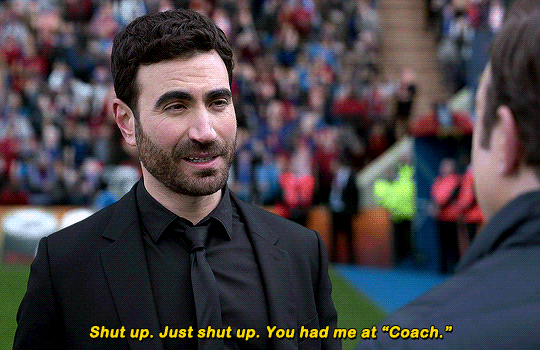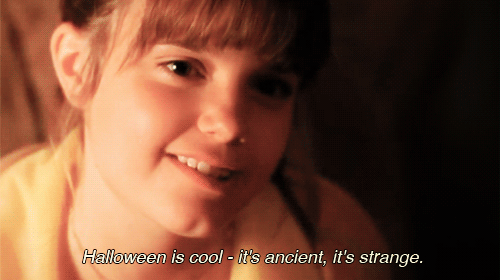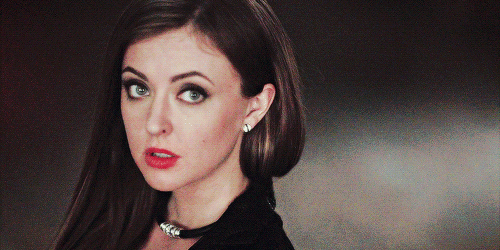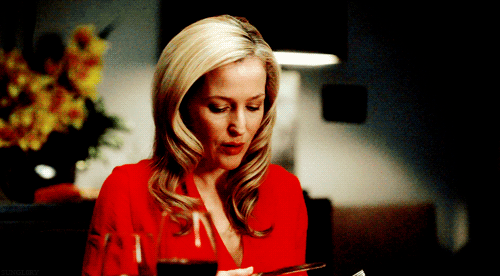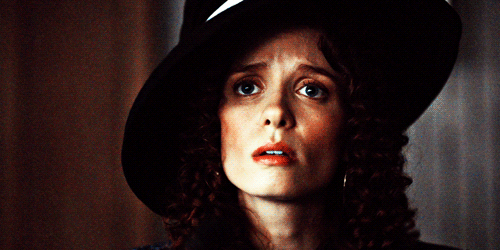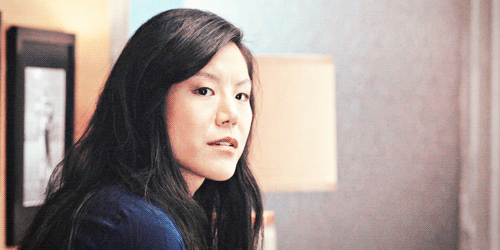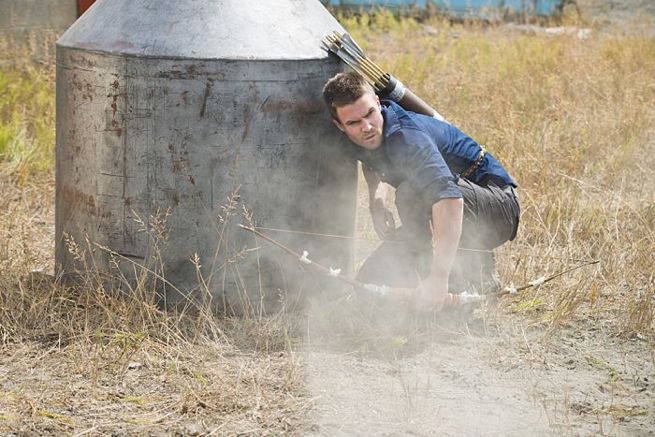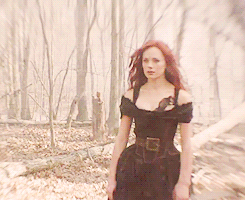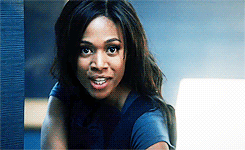STRONG WOMEN SERIES #4: The Women of Hannibal
Jaime Poland is a Creative Writing major at the University of Pittsburgh and will be graduating in December with her Bachelor's degree. She loves cows, the color orange, and John Krasinski. Jaime has been best friends with Jenn since they were wee little babies (or... you know, since like, eight years ago). Jaime's the Leslie to Jenn's Ann & the Abed to her Troy. And that's really all you need to know. Oh, also Jaime has a blog that she sometimes updates and a Twitter where she frequently live-tweets television and discusses how much she hates our friend Chelsea.
Basically, Jenn loves Jaime and Jaime loves her right back. (And it was totally not Jenn who wrote this introduction. Not at all.)
Hannibal, as I have purported many times on my Twitter account and sometimes on Facebook, is the best show that you’re not watching. It’s creepy and dark and psychological and everything about it makes you squirm and want to turn away from the TV for respite from the pain that you’re experiencing. But then Will Graham pets one of his dogs or makes a comment implying that he knows Hannibal’s secret or there’s just such a gorgeous shot that you find yourself looking back and even moving closer, wishing that this dumb, stupid, horrible show didn’t have such a grip on your heart.
Truly, the strength of
Hannibal lies in its characters (and its cinematography, but Jenn didn’t ask me to write a post about
Hannibal’s cinematography, but believe me, I could). Watching them play off each other and dance around Hannibal Lecter is fascinating, and the nature of the show itself can be seen as one long character study of Will and Hannibal. Because of that, the show doesn’t always have the time to pay equal attention to all of its side characters, but when it does, we’re rewarded with rich, three-dimensional people who occupy a place in this world. These side characters aren’t there just to fill space. They’re there to provide their own voice. The women especially are key to this series, and all have such strength and a large bite. They exist to fight and help and provide, and they do it while having impeccable hair.
One really important change came early on in Bryan Fuller’s endeavors to adapt the novel
Red Dragon into a TV show.
Red Dragon is the first in a series by Thomas Harris, and it focuses on Will Graham’s work with the FBI to catch a murderer. The show
Hannibal is meant to be a prequel to the book series, and is based on the history between Hannibal Lecter and Will Graham that the book only alluded to. When Bryan Fuller started to adapt the novel, he decided to make the characters of Alan Bloom and Freddie Lounds female, giving us Alana Bloom and Fredricka Lounds. Why? Otherwise, he thought there would be too many men on the show. The need for female characters and voices was built into the DNA of the show. In that sense, it’s one of the most progressive shows in television in terms of gender; it doesn’t feature female characters for the sake of saying they have them. The female characters are used just as meaningfully and specifically as the men, and are strengthened but not defined by the fact that they’re women.
There are six notable women on the show: Bedelia du Maurier (Gillian Anderson), Margot Verger (Katharine Isabelle), Abigail Hobbs (Kacey Rohl), Freddie Lounds (Laura Jean Chorostecki), Beverly Katz (Hettienne Park), and Alana Bloom (Caroline Dhavernas). Of those, only two were regular cast members, and by the end of season two, only one remained a regular (don’t forget to pour one out for Bev). Abigail, Bedelia, and Freddie have been recurring characters throughout both seasons of the show, and Margot is a huge force in season two. All six are hugely influential to the plot: Abigail’s existence is essentially the catalyst for Will and Hannibal’s relationship, and her storyline forms the main arcs of season one. Even her absence in season two is a huge plot point. The show’s attitude toward women is abundantly clear: these are characters that need to be here, the effects of their actions need to be felt, and their voices need to be heard.
I want to start my analysis of
Hannibal’s female characters by looking at Bedelia du Maurier, played by the angelic Gillian Anderson. On a show populated by confusing, complicated characters, Bedelia might be the most confusing and complicated of all. We’re introduced to her as Hannibal’s psychiatrist, but quickly, we see there’s more to Bedelia. There’s a question that stems from her first appearance about how much she knows about Hannibal, and it takes a while for us to find out – and even when we do, it doesn’t answer everything. Bedelia keeps things close, and knows how to protect herself even when it doesn’t seem like she’s in danger.
She’s smart enough to know that Hannibal is dangerous, and smart enough to know when it’s time to run away so that he can’t find her. She leaves after visiting Will in prison and telling him that she believes his story that he’s been framed for Hannibal’s crimes – and then she leaves suddenly, making it clear that she has no desire to help in the investigation against Hannibal, even though she knows the truth. She can’t afford to stick around and offer herself up on a platter (literally and figuratively, you guys, we’re talking about a cannibal here), and she doesn’t become sentimental just because our main character is in danger. She always always always puts herself first – and when Jack Crawford finds her and brings her back to Virginia to get her to testify against Hannibal, she’s furious. She leaves again, though she finally tells Will what she knows – that Hannibal is dangerous. So dangerous, in fact, that she knows there’s no escaping him. The second season ends with Hannibal and Bedelia on a plane together, leaving Virginia and the fates of four characters hanging behind them. Their relationship is complex and rich, and she might be the only person who understands him. She even tells him early on that she knows he’s wearing the suit of a person, but he isn’t one. Now she’s wrapped up with him, and it’s left to the audience to wonder just how far she’s willing to go to protect herself from someone she knows to be a monster.

Margot Verger, you guys. Holy feminism. She’s been tortured by her brother Mason, and finds herself archaically trapped by him: their father’s estate can only go to Mason. Even if Mason dies, it won’t go to Margot herself – it can only go to her son. If she has one. If not, the money is given away. No matter what, Margot gets nothing, and is forced to put up with her brother’s constant torture. Guided by her psychiatrist, the good Hannibal Lecter, Margot comes up with a plan: to become impregnated by Will and then kill Mason. Obviously.
Hannibal and its creator Bryan Fuller came under fire this season for this storyline, for a few reasons. For one thing, Margot seduced Will – but Margot’s a lesbian. Some fans were angry at the implication that she could “turn” for the sake of bedding the show’s main character, but this was before we learned what her plan was. Soon, it became abundantly clear that Margot was using Will for one purpose, and she had zero interest beyond what he could provide her in her plan to get away from her brother.
The other problem came when Mason thwarted Margot’s plan…by abducting her and performing a hysterectomy on her. Her fans were furious that she lost her agency, that this symbol of her womanhood was taken away from her…and that was exactly the point. Margot has had zero control over her life, and she found one option, as slim as the possibility of success was, to escape. But the point of her character is that she isn’t defined by her femininity. Having a child is certainly, for a time, something she had control over, but it’s also something she had no interest in before she realized she could use it to her advantage. Margot isn’t able to save herself at that point, but she also isn’t forced to have a child just to protect herself – and she manages to avoid having to rely on another man. She’s not able to stop her brother – Hannibal’s the one to do that, in what is probably the grossest moment that has ever been shown on television, ew, stop talking about it. But that’s not a bad thing. It’s not a bad thing, or an unfeminist thing, or a weak thing to be trapped, and to be unable to help yourself. Margot’s strength comes in her desire to be free, and her unwillingness to be like her brother. Hannibal manages to incapacitate him, and while Hannibal’s reason for wanting to kill Mason has nothing to do with Margot’s safety, the point is, Margot ends up free. And what does she do? She decides to stay with Mason and nurse him back to health. Because now, finally, she has what she wants: control.
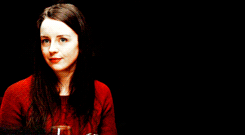

And then there’s Abigail Hobbs, without whom there wouldn’t be a show. The shadow of Abigail hangs over the entire series in a way that nothing else quite does – the mere idea of her spurs plot, conflict, and is a key part in changing Will and Hannibal’s relationship. The show is all about watching Will and Hannibal form a connection and then watching it fall apart, and Abigail is key in both bringing them together and pulling them apart. Sometimes the idea of Abigail is more important than Abigail herself – it’s not that she becomes like a daughter to Will and Hannibal, but that Will and Hannibal become like fathers to her. But even when Abigail is used as an idea, that idea is still infringed with the memory of her. It would be impossible to use her as such a strong image and catalyst throughout the show if we didn’t already know her to be such a compelling and complex character.
Abigail starts as a victim. Her father killed and mutilated young girls who looked like her, all to keep himself from killing Abigail. And, when the FBI finally catches up with him, he tries to; he kills his wife and cuts Abigail’s throat, and she winds up in in-patient recovery where she’s forced to deal with the guilt of her father’s crimes. And most of her recovery is guided by Hannibal Lecter, not that Abigail’s aware – he’s the only person she trusts, but she has no idea what he’s guiding her towards.
There’s kind of a pattern throughout the show of using people in ways they don’t see or understand. Everyone is a prop to him, who he spurs into action either to achieve some larger end or merely just to watch what happens. So, with that in mind, when I say that this series uses characters (like Abigail, or as he did with Margot, and basically every other character on the show), this is something that’s built into the DNA of the show. This isn’t Hannibal exerting control as a man over women; he doesn’t do it for the pleasure of manipulating women into becoming dependent on him, or to gain power over them. Everything that has happened on the show has been from his own machinations, and really, his main target has been Will Graham. Hannibal manipulates a character based on their position and circumstances, not their gender. What gives the characters, including women, their strength on this show is how they exist beyond the scope of Hannibal’s power over them, and how they fight free of it.
What makes Abigail so compelling is that she never frees herself from Hannibal – because she doesn’t want to be free. In season one, he’s the only person she can trust because she recognizes elements of her father within him. What’s so compelling about Abigail, and really about the show itself, is that we don’t get a lot of explanation as to what she’s feeling, or why she makes the choices she makes. So much of the meaning of the show comes through suggestion and the merest hints through dialogue. And so much of Abigail is only suggested, for a few different reasons. For one thing, she’s keeping secrets for most of season one. She’s smart enough to know that telling people the truth about what happened to her will make people group her in with her father, and she’s smart enough to know that she doesn’t deserve to be placed alongside him in people’s minds as a psychotic killer. It’s a question that recurs throughout the season: was Abigail helping her father kill all those girls? How aware was she of his actions? By the end of the season, we have answers that change how we perceive Abigail. She was forced to help her father because she knew doing so would keep her alive; she’s still his victim, but she’s not blameless.
That struggle to understand Abigail is central to Will and Hannibal’s relationship throughout season one, and thus lies at the heart of the show. But she’s not just a plot device; it’s Abigail herself that means so much to the two main characters, and Abigail herself who is capable of affecting them in the earth-shattering and plot-progressive ways that she does. Will and Hannibal’s connection to each other is able to be so destructive and intimate because it starts in such a personal, emotional place; they feel responsible for Abigail after the death of her parents, and feel as if it’s their duty to look out for her – Will because he came to understand her father’s outlook while investigating his crimes, and Hannibal because he sees someone he can guide through the world. Clearly Will’s intentions are a bit purer than Hannibal’s, but even when he finds out the truth about Abigail – that she killed Nicholas Boyle, that she helped her father lure in new victims – he still cares about her. He wants to protect her. And Hannibal takes Will’s desire to protect Abigail and uses it against him: he frames Will for Abigail’s death at the end of season one, creating the catalyst for season two, where Will is in prison for Abigail’s murder, as well as the murders of Hannibal’s other victims.
It takes a while, but finally, in the season two finale, all of Hannibal’s lies are revealed. Most importantly, we learn that Abigail is actually alive (sans an ear, which Hannibal shoved down Will’s throat to make it appear that Will killed and cannibalized her, isn’t this show great and family-friendly?), and that Hannibal’s plan all along has been for the three of them to leave Virginia and live together in Europe, happy, open, and fully embracing their darker sides. And, okay, Abigail does prove to be just a tool to Hannibal – he slices her throat, just as her father did, and leaves her to die, all to punish Will for revealing that he didn’t actually want to live a murdersome and, you know, gross life in Europe with Hannibal and Abigail. But Hannibal is only able to do that because he knows how much Abigail means to Will; he, and Will, are acutely aware that Abigail, this young, powerless victim, brought out something inside them both that they didn’t know was there. They were able to worry, to care, to want to provide; Abigail gave them both the ability to prove they have value within their dark, twisted minds.


Freddie Lounds is probably the most divisive character on
Hannibal, save, like, Hannibal himself (sometimes it’s very confusing and difficult to loathe him when he’s wearing nothing but a tiny bathing suit, okay). She runs TattleCrime, a crime blog that always seems to post insider information about crime scenes and police investigations that hasn’t been released to the public, and is often slanderous and quick to lead its audience to conclusions about these crimes. We see early on that Freddie’s methods of investigating a story include lying to police officers, sneaking into crime scenes, and trading, um, special favors with the officers investigating (we still love you, Brian Zeller). Will Graham and Jack Crawford make no secret of just how much they loathe her, and Freddie beautifully could not care less. She’s well aware that they hate her for often interfering with their investigations, and knows exactly when and where to keep one toe from crossing the line. She knows her rights, knows how to push them, and manages to keep herself just barely on the right side of the law when it comes to getting in Jack Crawford’s way.
But for as cutthroat and unapologetic as Freddie is, she’s not uncaring. Our first real exposure to the multiple facets of Freddie’s personality comes soon after Abigail Hobbs starts her recovery process. Freddie, who had been covering the crimes of her father, comes to visit her and to suggest the possibility of the two of them writing a book together, so that Abigail can tell her story and can be more than whoever the media or public opinion makes her out to be. Will sees this as exploitative, and because the audience is so aligned with his point of view, we see it as exploitative, too. But it isn’t. Freddie genuinely cares about Abigail, and knows what the story about Abigail is going to be – after all, Freddie helped write the story, and has written dozens like it before. She’s using her knowledge to help Abigail, and she truly believes it’s for the best if Abigail takes her story public. Of course, Freddie doesn’t have all the information about Abigail that we do, but even knowing what we do doesn’t make Abigail unworthy of being saved or finding redemption. We want Abigail to be okay, and we want Freddie to help her.
That conflict between Will and Freddie is another example of the show’s use of suggestion, and a good way to explain the role of women on the show. Again, our alignment with Will makes us tend to believe him and assume that he’s always right and knows best (and if you’re me, you just love him so much that you also get angry whenever anyone’s mean to him, but that’s a story for a different post). So even if Will’s positioning the audience to believe that Freddie’s being selfish and aggressively ambitious in trying to get Abigail’s story, that doesn’t mean that she is, or that the show is trying to position the audience to believe that. It’s not like anyone on the show has gotten to a place where they realize that Freddie is a good person deep down, and that were wrong about her, and no one on the show will probably ever get to that place. It’s through suggestion that we’re told we’re allowed to like her, that her ambition and shrewdness can co-exist with Will’s quietness and need to get better. Freddie might be the perfect example to show how female characters are used on this series. She’s not made to be special because she’s a woman, her behavior doesn’t get a pass, she’s not some abstract contradiction of all of Will’s traits. She’s allowed to be messy and determined and brash and also feminine. The first time we see her, she’s in her hotel room, naked and dripping wet, posting to TattleCrime just after getting out of the shower. She’s exposed, and so powerful.
And her power never leaves her. She’s an essential part of season two: she testifies at Will’s trial (against him, natch), and she performs an invaluable role in the attempt to find evidence that Hannibal is the Chesapeake Ripper they’re been searching for: the FBI fakes her death and makes it look like Will killed her, so that he can then go to Hannibal with his crime. Much like Abigail, this situation could not exist without Freddie herself. The victim had to be Freddie because of her role and function on the show. It’s not that Will needed to kill a woman; it’s that he needed to kill Freddie Lounds herself, because of her power and knowledge, and what her character represented in comparison to Will and Hannibal. Like Abigail and Margot, Freddie isn’t seen as being a strong character because she’s a woman; all three are strong, and are able to take their femininity and all that it represents and use them as strengths.

Beverly freaking Katz, you guys. I wrote that sentence and then sat here for ten minutes unable to say anything else because Beverly Katz is just so freaking great, and who am I to expound upon her greatness?
Okay, so the only way to discuss her greatness is to start at the beginning. Beverly works for the FBI, and heads the three-person team who assists Jack and Will on every case. She’s funny, she’s endearing, and she earns the audience’s love early on through her relationship with Will. She teases him in the pilot when he reveals that he’s not an FBI agent because he can’t pass the psychiatric evaluations, asking him “You unstable?” It’s still early enough that we don’t fully understand Will’s mental state, but we know from that episode that Jack and Alana are worried about how he’ll hold up in the field. Beverly is the first person who doesn’t treat him like he’s about to shatter. She wants to help him, but only if he needs help; she makes it clear later in the season that she’s there if Will wants to talk, but as a friend, not as a savior. Because of that, she’s the only person working with Will on these cases who actually trusts him to be okay.
Her trust in Will continues even after he’s arrested at the end of season one. In the season two premiere, Beverly visits him in prison, making it clear that she believes he’s guilty of what he’s been accused of, but she needs his help with the case they’re working on. Even though she no longer trusts him as a person, she still trusts his intellect and his opinion, thought she doesn’t believe him when he says that he’s been arrested for Hannibal’s crimes.
Hannibal is often disturbing, but it’s usually not heartbreaking. One of the few heartbreaking moments comes early in season two, when Hannibal kills Beverly. The worst part about it is that Beverly’s only there because she wanted to help Will – finally, after visiting him a few times so he could consult on the case files she gives him, she finally agreed to look into Hannibal. Nothing major, but just to poke around and see if there’s anything that could prove Will is telling the truth. For the audience, who is aware of the truth, it’s thrilling. We love Beverly more than ever before, because she’s finally going to help our baby Will Graham (hero. I meant hero. I said hero, right?). And the worst part of all is that she’s able to help him – she finds a secret room in Hannibal’s house that contains evidence of his crimes. And then she turns around and sees Hannibal himself standing there. Her death is sudden, surprising, and so hurtful; she was the only person on Will’s side, and the only person who could have helped him. What Beverly knows and what she possesses are concepts that no other character has; she didn’t necessarily need to be the character that died, but anyone else’s death would have meant something different. It was such a huge loss when Beverly died, because that particular voice and source of badassery was gone. One of the few good things that came out of Beverly’s death is the proof that Beverly mattered. She performed a role no one else did on the show, which ensured that her death wasn’t just to create drama or heighten tension, or just to create suspense around these characters. Her death, and the consequences of it for the characters, honored her character and what she meant to all of them. Beverly Katz isn’t a victim because she was killed; she’s a badass because her death changed everything.


I saved Alana Bloom for last, because her role is arguably the most complex of all the female characters. She’s the biggest character, the only series regular (well, the only one who’s still a series regular. We miss you, Beverly), and maybe the biggest victim of the war between Will and Hannibal. There’s a lot to look at with Alana, so I’ll start at the beginning.
Alana is an interesting character because she’s the only one who knew both Will and Hannibal prior to the start of the series. She’s a former student of Hannibal’s, and in fact is the person to involve him in Will Graham’s life. She knows Will because they both lecture at Quantico, but by design, she doesn’t know him personally. Alana has what she calls a professional interest in Will; like many psychologists who come into contact with him, she wants to study his brain works, but knows that she shouldn’t. So she purposely stays away from him to keep her curiosity at bay. So when Jack approaches her and asks her to perform an evaluation on Will to see if he’s fit for fieldwork, she refuses, and instead refers Jack to Hannibal Lecter. In a way, more than anyone else, she’s the catalyst for everything to come.
Like with Margot, there’s been some controversy surrounding Alana because of her romantic entanglements with Will and Hannibal. Her relationship with Will, brief as it is, comes first; we learn in season one that Will has feelings for her, and he calls her often when his hallucinations first begin. He trusts her in a way he can’t trust anyone else, and Alana’s happy to help him – but she knows that taking that relationship any further isn’t healthy for either of them. Will kisses her, and while she kisses him back (because, you know, who wouldn’t), she immediately tells him that if a patient was in a similar situation, Alana would advise them not to get involved, and so she must take her own advice and stay away from Will in that capacity. It was probably one of the first times where a ship got to that point, where one character said they need to stay away from the other, and actually meant it. After that episode, you’re not left sitting around waiting for Alana to decide she really wants to be with Will. You believe her when she says it’s best for her to stay away, and more importantly, you want her to stay away for her own health and so she can continue to help Will.
Because, truly, she is the only one who can really help Will. Beverly eventually is able to help him once he’s imprisoned, but Alana is able to protect Will from himself. Even once he’s arrested, Alana makes it clear that she still sees the person inside of him, the one who was taken over by what she thinks was his mental illness that made him start killing people. But she’s not magically able to save him, or immediately trustful of him; she still believes that he committed the murders, just that he wasn’t aware of it because he’s mentally ill. But still, she wants to help him, and offers to take care of his adopted dogs while he’s in prison (a moment that made me cry for ten straight minutes, if anyone was wondering). As frustrating as it could be as an audience member knowing that Will was being framed for Hannibal’s crimes, watching Alana offer to help him but still believing the worst of him, the storyline made it abundantly clear that Alana is intelligent, and that intelligence will not waver. Unlike some movies or TV shows that feature women in fields that require high levels of education just for the sake of saying they have smart female characters, this series shows us at every turn that Alana’s intelligence is part of who she is. She’s not going to forget her own advice or what’s best for her just because Will Graham has a pretty face, or because it would be advantageous for her to forget her years of experience just because it would be nice in that moment if she would help Will. Her existence doesn’t depend on when the main character needs her to exist, and her traits aren’t dependent on who the main character needs her to be; she exists very much on her own, and influences and is influenced by Will, while still remaining a strong and inspiring female character.
It’s really her relationship with Hannibal that earned the character and show some scorn in season two. Throughout season two, more characters start questioning Hannibal, and begin wondering whether or not Will is telling the truth. Throughout this, and while being aware of it, Alana begins a relationship with Hannibal, causing many fans to constantly question how she could be so stupid. Even if she doesn’t believe Will, why can’t she investigate his claims? If Jack is believing to doubt Hannibal, why can’t Will? Honestly, it’s sort of a close-minded argument, because it’s one that can only be made because of how much knowledge the audience has about Hannibal. Put yourself in Alana’s shoes: a man she trusted, who she had feelings for, but knew was unstable proved himself (in her eyes) to be unstable. She, and other medical professionals, believe they’ve diagnosed what’s wrong with Will, and part of that contains the fact that he’s unable to accept responsibility for his crimes. For how much she trusts and cares about Will, she also knows that the thing she believes is in his head is making him say that he didn’t kill anyone, and that Hannibal is truly to blame. As for Jack, he’s not letting Alana in on the investigation. She has absolutely no way to know that Will is no longer the only one who doesn’t trust Hannibal. So of course, with everything going on, she turns to someone she believes she can trust, who she’s known for years. Hannibal has been in her life for years, so of course when this sudden situation springs up, she’s going to choose to believe the person she’s known before all this began.
It is kind of problematic that, for a few episodes, Alana is only really seen in connection to Hannibal. Their relationship becomes a focal point, and largely the only scenes she has for a few episodes. And it’s painful, because when we see her, we see how Hannibal is using her: he drugs her so he can sneak out and frame Chilton, then comes back and is able to have her to verify his alibi and throw Jack off his trail for a few more episodes. Now, I wasn’t in the writers’ room, so I can’t speak to their intention with the relationship, but the sense I get is that it’s supposed to be problematic that this is the only lens through which we see Alana. We’re literally seeing firsthand how Hannibal is using her and their relationship, just as we’ve seen firsthand how he used Will and Abigail and Jack. There’s no difference in his mind to how he treats people, but the fact that he’s purposely put Alana in a position where she relies on him and has little to no identity beyond being his girlfriend is, I think, supposed to be there. We’re supposed to be upset by this, because Hannibal is limiting the Alana that we know and love, and crippling her so she’s unable to be used to her full potential. Making her nothing more than the girlfriend for a few episodes means that when she’s finally freed from that role, she’s going to revert back to her real self immediately – and it just makes it that much more suspenseful in the finale when she’s in a position to maybe win back some of her power from Hannibal. And, well, okay, she doesn’t, she sort of gets thrown out a window, but the point is, she’s earned back her power, and earned the right to exert that power over Hannibal. She’s finally just as much of a player in this war against him as Will and Jack are, because just as he did with them, Hannibal pulled her in, manipulated her on such a close level, and then stepped back to watch what would happen next. In the finale, Alana even says to Hannibal, “I was so blind.” His response? “In your defense, I worked very hard to blind you.” Alana isn’t weak, and the show isn’t misogynistic because of what happened to her. Hannibal fooled her, just as he’s fooled everyone else on the show. The only real difference with what happened to Alana is that the audience connects with it on a different level because it’s through a romantic relationship, and it’s such a reversal of tropes we’re so familiar with. A couple who’s had a flirtation since the early days of the show is supposed to end up together and be happy; it’s not supposed to be tragic and manipulative and painful. But it’s a story worth telling because it’s a story that happens, and Alana is truly the only character who can be put in that position and still come out strong.
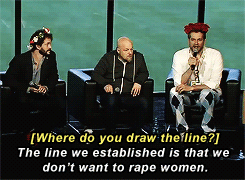
This GIF comes from Comic Con 2013, when Bryan Fuller was asked about how the show uses violence. Now, I basically grew up watching crime shows; I get how they work, and I’m used to their patterns. But I don’t think I ever realized how tired I was of seeing violence against women until Bryan Fuller publicly stated that
Hannibal is aware of it and will never unnecessarily depict violence against women. He went on to say that in the writers’ room, they’re aware of the dangers of this, and so they make a conscious effort to make sure the number of male victims equals the number of female victims. For a show whose violence is so over the top and such a large fixture of the show’s identity to say that there is nothing artistic or valuable in seeing females get raped is such an amazing, beautiful commentary on entertainment and the responsibility creators of that entertainment have to their audience.
As I have stated on many occasions,
Hannibal might just be the best show on television. But even regardless of its quality, this show
feels important – it feels like it’s doing and saying important things, and a large part of that comes from how it creates and uses its characters. Everyone has an important and distinctive role, and has a function to perform that could not be performed by anyone else. What’s so great about its female characters is that they don’t have to be female – there’s nothing about their roles that demand they be female, beyond Alana’s romantic subplots, and they’re certainly not defined by the fact that they’re female. What makes them so powerful, and what makes the show so progressive, is that these characters are enhanced at every turn by their femininity. They’re able to fill the roles of a daughter, or a girlfriend, or a bitch, while still showing different sides and refusing to be locked down into one box. They’re people, flawed and complex and compelling, just like Will and Hannibal and any other male character on the show. This is Bryan Fuller’s design, and it’s a design that makes me proud to be a
Hannibal fan.
Endless thanks to the brilliant and articulate Jaime for writing a post about the leading women of NBC's Hannibal for the fourth installment of the Strong Women Series! She definitely did this show justice (in my opinion and that's coming from a person who's never watched Hannibal) in discussing what makes each of these characters strong and how strength looks different from character to character and from show to show. Continue the discussion in the comments about these women and be sure to tweet Jaime some love if you enjoyed the post! :)

